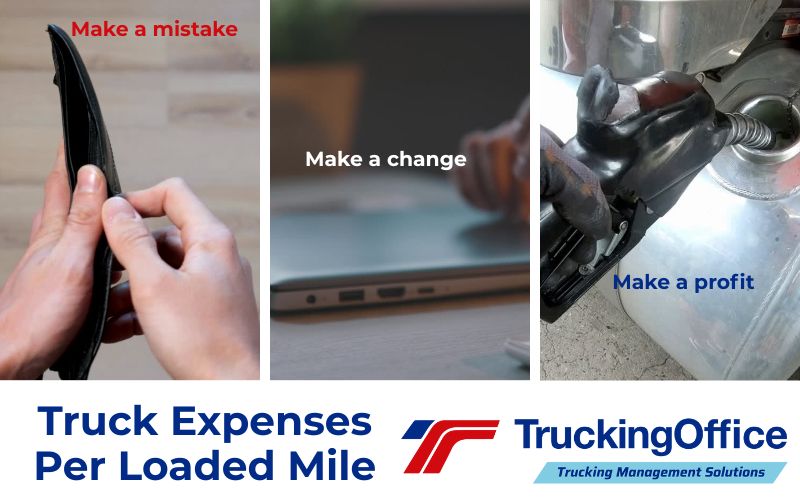In the trucking industry, the owner operator is a major component. Sure, contracts with shipping companies are a major factor, but we know that half of the truckers on the road are independent. Those truckers have the freedom to choose their loads, but also the responsibilities of managing a company. Tracking expenses per loaded mile is just one piece of data that can lead to success or failure.
Making Money or Making Mistakes?
The purpose of a trucking business is to make money. Trucking businesses are not non-profit agencies.
Making money isn’t – shouldn’t – be an accident. Every trucker who agrees to take a load should know how much it will cost to haul so they don’t take a loss on the trip. That sounds very simple, doesn’t it? It’s just a number. Can it be that hard, computing an expenses per mile number, can it? The problem comes when it’s time to compute that number of loaded miles, not all miles.

But it’s not an easy number to find.
Sure, it’s obvious what the expenses are for a load. The smart trucker knows to keep track of expenses – even those that don’t get billed to the shipper or are tax-deductible. But some hidden expenses aren’t attached to a load.
- IRP, IFTA and HVUT (and other taxes)
- Business Insurance and Bonds
- Medical Insurance
- Loan Repayments
- Salaries
- Living expenses
- Garage for secure storage and repairs
- Maintenance
- Office expenses
Some of those are monthly out-of-pocket expenses, such as medical insurance or loan payments. Others may be more randomly spaced, such as maintenance. How do we figure out a simple number with all these variables?
Then there are the unloaded miles. Deadheading to the next load or back home still cost money. Fuel, food, and IFTA/IRP taxes apply.
Since truckers are paid per mile, monthly expenses are complicated to factor in.
QuickBooks vs. TMS Trucking Software?
We like QuickBooks. We have a way to export data for the tax accountants that need it. But that doesn’t make it the right software package for independent owner operators. QuickBooks does have a mileage feature, but it isn’t one that truckers can use. It’s used to calculate tax-deductible miles, not pay per mile! It doesn’t recognize the unloaded miles.
That’s why truckers know they need an industry specific package – trucking management software (TMS). Trucking software that will take an uploaded ret con and create a dispatch and a route automatically. Then when the BOL and the expenses are uploaded through a smart phone or tablet (no typing needed!) the invoice is ready to send – no waiting to get home and do it all when the trucker could be heading for the next load.
It’s not a complicated decision. If QuickBooks can’t tell a trucker what the expenses per loaded mile are, then it’s not the right program.
Don’t make a math mistake – or try to depend on an expensive accountant to tell you how much it costs a truck to haul a load a single mile.
Variables In Expenses Per Loaded Mile
The exact expenses per load number is going to change a bit, week to week, load to load. A cross-country trip with a light load versus a week’s worth of over-sized loads that are only a couple hundred miles – those variables will be significant.
Truck expenses change. That’s why it’s important to keep track of it regularly.
Hold on – I’m not telling you to get the calculator out after every trip.
Use a trucking software package that figures it out for you.
Like TruckingOffice PRO trucking management software. We have reports that will show you where your money is going, where it’s coming from, and give you that simple expenses per loaded mile number to decide what to take for your next load. To stop you from making a mistake instead of making money.
You can’t manage your expenses until you know them. TruckingOffice PRO is here to help you do that.
Make a Change to TruckingOffice Trucking Management Software
We’ve got affordable TMS trucking software that handles everything, including automatic rate con uploads and expense receipts uploads. TruckingOffice PRO with TruckingOffice ELog makes your life easier and managing your business smoother by helping you handle your tasks better and faster:
- dispatches
- routing
- invoice generation and tracking
- expense management
- IFTA and IRP
- maintenance
- Trucker Stats™– reports to show the state of your trucking business.
Combined with the TruckingOffice Electronic Logging Device, you’ve got what you need to build a successful trucking business – even from the cab of your truck.
Contact us today to try TruckingOffice PRO‘s free trial to help you avoid loads that cost you money to deliver and to discover what equipment is the most profitable for you.








Recent Comments